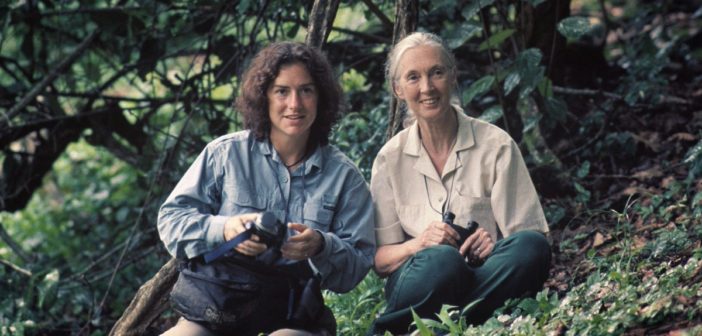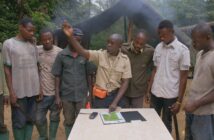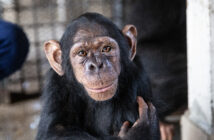Dr. Jane Goodall started research at Gombe Stream National Park in 1960, and the discoveries made by Jane and researchers who followed have redefined our understanding of and relationship to chimpanzees as our closest living relatives. The legacy she left at Gombe continues today through JGI and other institutions thanks to the efforts of scientists and researchers from around the world. One such Gombe scientist named Dr. Elizabeth Lonsdorf researches the incredible intricacies of primate social structure, development, behavior, and health.
Lonsdorf first became affiliated with JGI while completing her Ph.D. in Ecology, Evolution and Behavior at the University of Minnesota’s JGI Research Center for Primate Studies, where she examined the development of tool use skills in wild chimpanzees. In her current research at Gombe, she focuses focuses on behavioral development and the intersection of health and behavior in wild chimpanzees. She returns every year to Gombe to maintain this research program. Lonsdorf is an Associate Professor in the psychology department and animal behavior program at Franklin and Marshall College, the Director of the college’s primate research program, a National Geographic Emerging Explorer, and serves as a board member for Chimp Haven, the national chimpanzee sanctuary.
What’s Elizabeth Up to Now?
In one study, using data spanning 24 years, Dr. Lonsdorf characterized maternal sibling and infant relationships. Lonsdorf wanted to determine whether they differed due to factors such as age and sex of sibling or infant. What we know about chimpanzee society suggests that young females will display more interest in their infant siblings, potentially as practice for motherhood, and young males might show interest in order to forge relationships with potential future allies.
What did Dr. Lonsdorf end up finding? Older brothers were more likely to play and groom with infants, and this was driven by male-male sibling pairs, who played more than all other types of sibling pairs. This can be linked to fact that male chimpanzees stay in the community in which they were born (while females typically move to a new community) and therefore, strong male-male bonds are important in adulthood. Also, we know from previous research conducted by Lonsdorf that male youngsters play more in infancy than female youngsters.
Learn more from Dr. Lonsdorf in our exclusive interview below:
How did you first start studying primates?
As an undergraduate at Duke University, I pursued an opportunity to study the Aye-aye at the Duke Lemur Center. Aye-ayes are the most unique and endangered primate and my task was to observe how infant aye-ayes develop foraging behaviors. This led to a lifelong interest in watching baby primates and trying to understand the factors that influence their development.
Capuchins are sometimes called the Great Apes of the New World. Along with your research on chimpanzees in Gombe, what does your work to understand primates help us better understand about humans?
Humans have unique capacities for empathy, cooperation, problem-solving and cultural evolution. However, the roots of all of these capacities can be found in our primate relatives. Like chimpanzees (and humans), capuchins exhibit complex social dynamics, as well as impressive cognitive skills and problem-solving abilities. Understanding the co-occurrence and extent of these abilities in our primate relatives helps us to determine how humans became the unique primate we are.
What might your findings about chimpanzee health at Gombe mean in general and for future research?
We know that disease is a fundamental conservation concern for populations, and that illness and injury are significant events in the lives of individual chimpanzees. Our health research focuses at both the population level; for example, by quantifying the impact of SIV infection on the population, and at the individual level, to determine how illness or injury impacts survival, reproduction and development of individual chimpanzees. It is our hope that this multi-scale approach will allow us to better understand the impacts of health insults on both populations and individuals, as well as mitigate these risks where possible.
As a woman in this field, have you faced challenges? How do you use your role as a voice and support to other women and girls entering scientific fields?
Unlike many scientific fields, primatology has had outstanding female role models, like Jane, since the beginning. I feel extremely lucky that Jane and others paved the way for female scientists early on, and I try to continue that tradition by regularly speaking to schools and in other public venues about my work and the work of women in primatology and in science at large. In my job as a professor, I involve female students in my research at all stages and hopefully, act as an example of a working-mom scientist.
Connect with Dr. Lonsdorf at elizabeth-lonsdorf.com/, and on Twitter @EloLonsdorf.
Why it Matters
The discoveries of our founder, Dr. Jane Goodall changed the world. Most importantly, as a young woman, Jane showed everyone what is possible when you follow your dreams and use your intuition to uncover amazing things. At JGI we believe in the power of research, curiosity, equity, and compassionate leadership for all people, and particularly in support of the bold women using knowledge to build a brighter tomorrow.
Want to support research in Gombe and start your journey of discovery? Join our BRAND-NEW Gombe Science Heroes program and get insider photos, writing, videos and more plus support the longest running wild chimpanzee study in the world!
BONUS: Show off with your very own JGI exclusive ‘Girls Just Wanna Do Science’ gear here.

The Jane Goodall Institute is a global community conservation organization that advances the vision and work of Dr. Jane Goodall. By protecting chimpanzees and inspiring people to conserve the natural world we all share, we improve the lives of people, animals and the environment. Everything is connected—everyone can make a difference.








